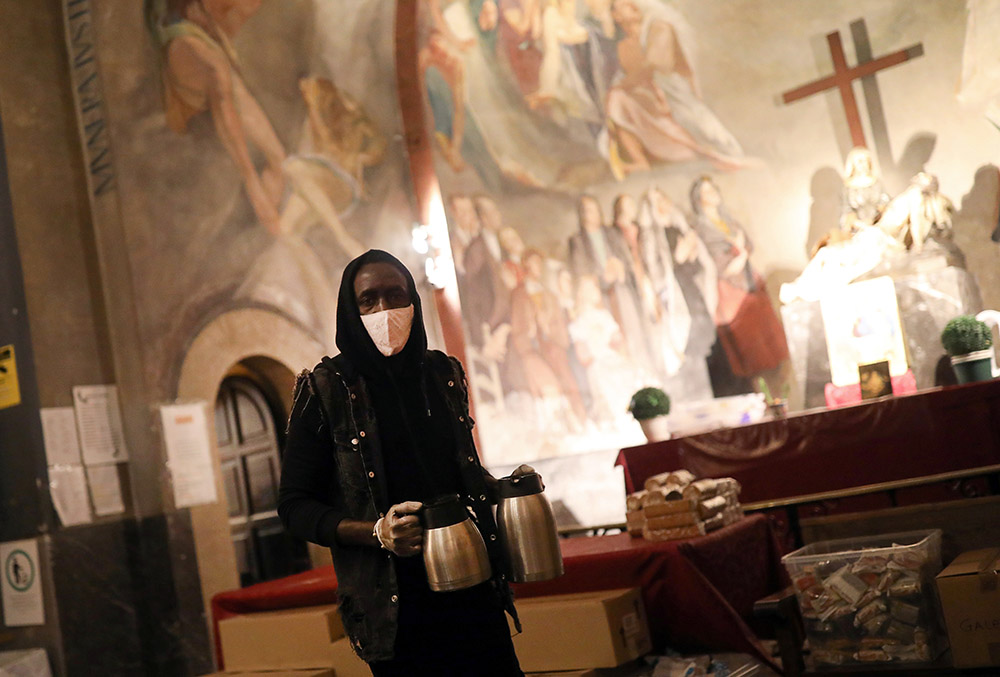
A volunteer carries coffee for people waiting for a free meal at the Church of Santa Anna in Barcelona, Spain, April 21, 2020, during the COVID-19 pandemic. (CNS/Reuters/Nacho Doce)
Historians tell us that the ancient Incas' preferred method of incorporating new groups into their empire was by gift-giving. A delegation would enter a foreign territory carrying an abundance of food and rich offerings to demonstrate how people's lives could thrive under their rule. If that didn't work, they found other methods to subjugate the group.
The Incas provided a wobbly attempt at something like Jesus' model of servant leadership. The great distinction between the Inca and Christian approach is that Jesus limited himself to the humble, vulnerable power of service and attraction, never moving into coercion. That made him a threat to people who flaunted their status and strove to control others to their own advantage.
Today's selection from the Book of Wisdom portrays clearly the fate of prophets like Jesus. Their humble dealings with others create an implicit critique of authoritarianism and religious pretension.
As we see everywhere from neighborhood playgrounds to international politics, people who act with great generosity, who serve by bringing out the best in others, are frequently recognized as a threat by those who need to make their importance felt.
People who strive to be first, whose driving motivation is their own advantage and advancement, cannot abide the servant leader. The servant's style unmasks their egoism.
At their core, those who wield dominating power intuit their own weakness. They know that they are susceptible to anyone with greater power and thus they must hold tight to their fragile supremacy. Deep down, they understand that their control is limited to the efficacy of the threat they can muster. They gain a following by inspiring fear, an emotion incapable of generating loyalty.
Jesus relied solely on the attractiveness of the message he incarnated, a method so contrary to the way of the world that, like us, the disciples found it extremely difficult to grasp.
Today's Gospel presents Jesus' second attempt to help his disciples understand that his enemies were going to use all the coercive power at their disposal to put an end to him and his ministry. Worse yet, it would look like they succeeded. The first time Jesus taught this way, Peter tried to correct him. This time, Mark says the disciples were "afraid to question him." Obviously, they were beginning to understand what he was saying.
Their fear was entirely rational. It wasn't just that Jesus was going to suffer, but his fate involved similar implications for them. Love him as they did, they weren't quite ready to go that far.
Additionally, they were still enthralled by the images of power that surrounded them. They had suffered under Rome's domination and, as simple people, they were cowed by the sophisticated, haughty religious elite. Except for Jesus, they had precious few examples of authority that expressed itself in love that empowered others and created unity. Competition and power struggles were much easier to understand.
When the disciples prayed today's psalm saying, "By your might, defend my cause," they probably imagined God crushing their enemies. In contrast, Jesus longed for them to comprehend the power of the invincible love of God. They wouldn't really understand that until they saw it played out in the cross and Resurrection — exactly the scenario Jesus was preparing them for.
Advertisement
As we listen to today's readings, rather than wonder at the disciples' thickheadedness, we might examine our own attitudes about power, service and love.
The message Jesus taught with his life was that God's dominion is solely one of attraction. God so loves the world that God will have nothing to do with coercion — not even to save the Son from suffering and death. Instead, the greatest revelation of God's character shines through Jesus' refusal to allow any rejection, threat or suffering to cause him to abandon his mission of making God's love present.
The Incas' offering of the good life was tentative. Unlike God, they abandoned that method if it didn't produce rapid results. What they and political and religious systems before and after them failed to do was to prioritize the faithfulness that flows from love. Love is the only power capable of generating genuine loyalty, a faithfulness that is stronger than death.
Today's liturgy invites us to assess our personal and communal relationships with God and one another. Do we, like the Incas, attempt coercion when love seems too weak? Are we willing to gamble that servant love is sufficient to transform evil? Do we as a church give witness to such fullness of life and joy that we entice others to give their lives to it?
Today, we are invited to walk the road with Jesus and his thickheaded disciples, praying that we, too, can learn the invincible and irresistibly attractive power of self-giving love.








